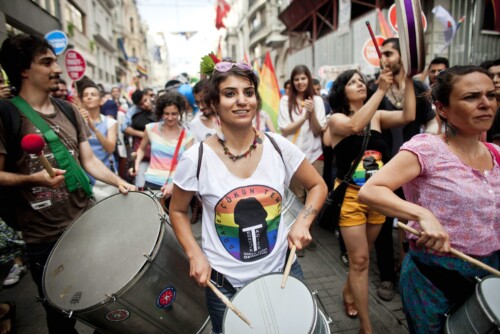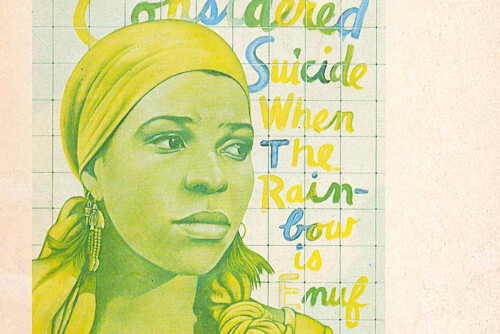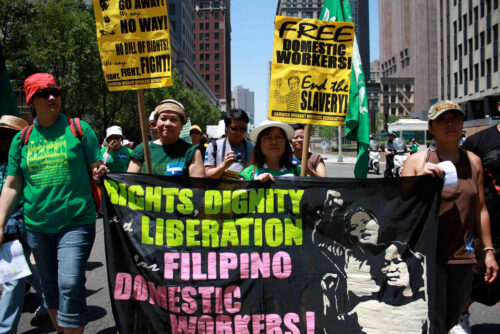Radical Tenderness, Impossible Love and Kitchen Table Spaces
Dani & Daniel: There isn’t a utopic community that we will one day find. The communities that we are interested in are based on difference and that’s what makes them exciting. Sameness bores us! Frustration and disagreement are a part of working in different communities and so this concept, ternura radical (radical tenderness) is a lens through which we try to work through acknowledging difference and different kinds of violences. We are not all the same. Our differences are present and being able to work from them in place of denying they exist is where we want to work from. This is also to say that not only the people who share the same experiences can be there. We may not understand each other fully, but we can love each other anyway.
Fatima: I love that term “radical tenderness,” Dani and Daniel. Recently, the term I’ve come up with is “impossible love” as a means to talk about some on-the-ground activist ways of operating outside of and beyond simple reactionary and divisive politics. My concern is with that space as a queer of color I inhabit everyday, that in-between neither/nor space between white queer and critical race or people of color activism where we find ourselves, which I am calling the queer shadows of empire. This conversation we’re having intersects with where I feel my transnational queer work is taking me.
I loved how Ghadir wrote this article, how she brings in her personal story and talks about the struggle she had being complicit with something and then recognizing the many ways that it was never complicity but coming to her own voice, finding a space to work as a Palestinian feminist activist who had been very provisionally given access to queer spaces in Israel. That slow recognition of how intrinsic racism and denial of Palestinian existence was part of the queerness she had been invited to assimilate. It resonates with my journey of coming out in Canada, in that “queer” in Vancouver only recognizes one kind of coming out, not the one in Kenya.
For me, radical tenderness or impossible love came into Ghadir’s story, and the ones many of us have as transnational queers. I see that as a thread in this conversation, about how the in-between spaces we inhabit have the potential to make us to love more, because we are outside of it in a sense. We are not seen as properly critical race or queer. My work on queer is in effect as much a challenge to critical race scholarship and anti-racist organizing, and not only to racist white institutional knowledge. There’s something to be gained in looking at these queer shadows of empire, and not only knowledge by postcolonialists and critical race scholars that only really recognize us when we say something that fits with what they consider a strong enough resistance. I’m afraid talking about “impossible love” or “radical tenderness” might not cut it either, but it’s our loss as anti- or decolonialists if we don’t speak to it.
Di: Dani and Daniel’s manifesto is amazing, even though I read it through Google translation and am “accepting radical ambiguity” made by the loss in translating. Relating it to the space issues in China, the limiting space is what I love and hate almost at the same time. I guess it is not hard to understand why I hate censorship given all the stress and fear it creates. The loving part is that it is like a personal body trainer who makes you always uneasy about your existence and pushes your brain to work out. Well, censorship is also like software and you are a virus. It always threatens to break you (and sometimes it does) and forces you to regenerate a new self, a new self that is undetectable by the censorship. So, how can I (not) love this space that hurts me so much?
My two lesbian activist friends just recently got married illegally in China, to make news and to draw continual attention to their detention case in March 2015. Will a wedding ceremony, such a classic textbook example of performativity, be one of the most powerful sites to disrupt heteronormativity? And how? I have been thinking about this and the kitchen table. For me, kitchen is one of the most productive spaces at home, and closely connected to housework, the (re)producing and maintaining of the home. How can we rebel on a kitchen table?
Karma & Hana: The kitchen table of course has a long history in queer feminist organizing and theorizing. From the US based “Kitchen Table Press” in the late 70s and early 80s to Jin Haritaworn’s recent theorizing about the possibility of the queer kitchen table in Berlin, to a long history of kitchen table theorizing in black feminist thought, to a recent intersectional dialogue between Carmen Romero Bachiller and Raquel (Lucas) Platero, this concept has staying power1 . One of the reasons for this is the way it blends the intimate sphere of the home with labor—housework as Di mentions, but also preparation work like organizing. Di’s comments also seem to point to how much of the work so many activists do originates during kitchen table conversations.
Activism – Defining the Political
Di: Last year on the International Day Against Homophobia, Transphobia and Biphobia, we put stickers on the subway that said “homosexual priority.” So basically they just copy the words of like “pregnant people priority” or “disability priority” and they were put on the subway. We made the sticker colors fit in the space so people would accidentally sit on this kind of injured seat because it’s stigmatized. Then activists or volunteers use social media and cell phones to record video and ask everyone who accidentally sits on that seat, do they know where they are sitting and why they’ve sat there. “Are you gay? Is that why?” Sometimes the seat is left empty and people try to stay away from this tabooed or injured seat. It’s playful and also confrontational because you have to talk to the person and be ready for the response. And I remember from a video we posted online, there was a middle-aged man who was trying to teach us about how misbehaved we are. More people responded ambivalently with words like “in such a big city (Beijing), it is good to have some of ‘that,’” while intentionally not mentioning the word on the sign, “homosexual.” This tactic itself invites people, a general passenger, to think about something that queer people might have to face every day.
Ryan: My activist, artistic, and scholarly work is a bit all over the place. I don’t have an allegiance to a particular organizing strategy or issue and likewise I don’t have an allegiance to a particular form of creative work. By shifting the old radical mantra, “by any means necessary” to “by any medium necessary” I find the context and goals for certain issues demand a certain kind of organizing or cultural response. To participate in the many issues pertaining to queer life and politics, one needs to be strategic about how to participate when energies and resources are scant. So I like to think of all my work as a constellation of projects varying in medium and strategy that work to radicalize queer politics and queer radical politics. For an example of the former, my recent work co-organizing a bloc of queers to march in Montréal’s very commercial and depoliticized gay pride parade under the banners HIV ≠ CRIME and SEX WORK ≠ CRIME—two issues of criminalization in Canada that we are struggling with. And for the latter, my work in queer conversations about class, particularly in regards to how transnational trade deals will impact queer people, and at this particular moment how the Trans-Pacific Partnership (TPP) Agreement will impact international patent law and restrict the production of generic HIV medications amongst others.
Karma & Hana: Sometimes the way that we discuss transnational politics has the capacity to flatten impacts on particular contexts, which can then minimize a sense of urgency in relation to taking action. For example, the TPP is clearly something it seems like has a negative impact on a host of people, including those with HIV, but what kind of localized actions does that negative impact compel? And as Fatima’s example above about the complexity of transnational solidarity in anti-apartheid struggles suggests; even if we take a concrete action, it may not be one that reflects the urgency of those most impacted.
Ghadir: I think when you say urgency, the region known as the Middle East and North Africa has witnessed some of its most devastating periods: while dictatorial regimes were overthrown, others were created. The bloody conflicts that ensued forced millions of people to flee their lands. The displacement of refugees can only bring back the traumatic memory of the Palestinian Nakba, and remind us that to this day, countless Palestinians are either scattered in refugee camps around the globe, or treated as second-class citizens in their own land. We cannot perceive the plight of the Palestinian people as dissociated from the state of urgency in the region, especially that both locals and internationals have the power to make change happen.
Our individual and collective power can and should pressure the Zionist system that has perpetuated its oppression continually for almost seven decades now, controlling the lives of every Palestinian living inside the occupied Palestinian territories or the state of Israel itself. We have the power to stop this oppression through international law, through the international court, through promoting BDS and calling for our fellow activists, organizations, academics, and ultimately our governments to end their complicity with the state of Israel. So I think that what we can do in terms of solidarity is very specific and concrete, and goes beyond feeling heartbroken and helpless in the safety of our homes whenever there is a mediatized war on Gaza. Palestinians face violence every single day.
For many years, the conversation about Palestine was confined to occupation. Today, with Palestinian queers and BDS, the discourse has shifted to social justice and human rights and dignity. So, if BDS, which is a rights-based movement that is democratic, inclusive and calls for the right of self-determination of the Palestinian people in accordance with international law and universal principles of human rights is a threat to Israel, what does that say about Israel?
Karma & Hana: Ghadir reminds us that, even when thinking about transnational solidarity, we must return to particular cases emerging from the demands of the most impacted people in specific locales. Local specificities are, of course, conditioned by transnational factors, which in many cases complicates what solidarity looks like. When there are so many factors to keep clear about who colludes with what—economically, politically, socially—concrete, politically pure actions can seem nearly impossible. Transnational queer solidarity, however, can also be deceptively simple: Do you want to be in solidarity with Palestinian queers? The way that Palestinian queers are asking you to do that is by joining the BDS. This action is clear cut, but as this conversation shows, it is only one kind of transnational queer activism among many. If nothing else, we hope the diverse views and approaches reflected here offer important considerations for anyone currently engaged or considering engaging such work.
- Haritaworn, Queer Lovers and Hateful Others; Barbara Smith and Beverly Smith, “Across the Kitchen Table: A Sister-to-Sister Dialogue,” in This Bridge Called My Back: Writings by Radical Women of Color, ed. Cherríe Moraga and Gloria. Anzaldúa (New York: Kitchen Table: Women of Color Press, 1983); Olga Idriss Davis, “In the Kitchen: Transforming the Academy through Safe Spaces of Resistance,” Western Journal of Communication 63, no. 3 (1999); Carmen Romero Bachiller and Raquel (Lucas) Platero, “Dialogos interseccionales sobre lo butch/femme, las diasporas queer y lo trans,” in Intersecciones: Cuerpos Y Sexualidades En La Encrucijada, ed. Raquel (Lucas) Platero (Barcelona: Edicions Bellaterra, 2012). [↩]




